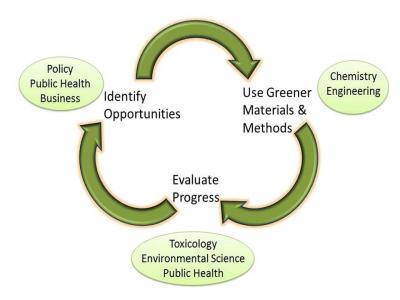
Developing clean energy technologies that are truly sustainable will require a systems approach that considers multiple environmental and social impacts in tandem with research and development. The research program of the SAGE IGERT aims to develop inherently greener energy technologies by incorporating impact assessment into the earliest stages of clean energy research. Specifically, SAGE will offer interdisciplinary research opportunities to students in biofuels, solar energy and energy storage. These three thrusts match significant research programs already underway across the participating academic units.
Often, the environmental impacts of new energy technologies are assessed only after they have been developed and widely deployed, when these impacts are most visible and easiest to measure. Yet the largest opportunity to explore how innovations can minimize impacts exists at earlier phases of research and design. Safety and efficiency gains made during these phases will result in significantly fewer costs and impacts during the deployment and decommissioning stages. By applying—at the outset—a systems approach that considers potential impacts of all stages of research, development, deployment, and decommissioning (RDDD), the next generation of green energy technologies can avoid the often costly unintended consequences of new technologies, thus maximizing their efficiency and sustainability.
This new model for innovation holds great promise. Green chemistry provides the intellectual framework for considering future impacts during the design phase of a new technology. Green Chemistry practitioners seek to guide the design of safer, more efficient chemicals and processes at the molecular scale. This systems approach to green molecular design has already resulted in many safety and efficiency gains in chemical-intensive industries. For example, some pharmaceutical processes redesigned with green chemistry have saved millions of dollars and reduced the number and severity of risks associated with manufacturing.2 Similar gains should be possible in the chemically intensive development of clean energy technologies. The research thrusts of this IGERT include the most promising leads in energy technology development, including biofuel, solar energy, and next generation storage technologies being assessed by interdisciplinary teams of faculty members at UC Berkeley. The SAGE program builds on the initial interdisciplinary successes of the Berkeley Center for Green Chemistry, creating a significant potential for broad impacts from this new training program
